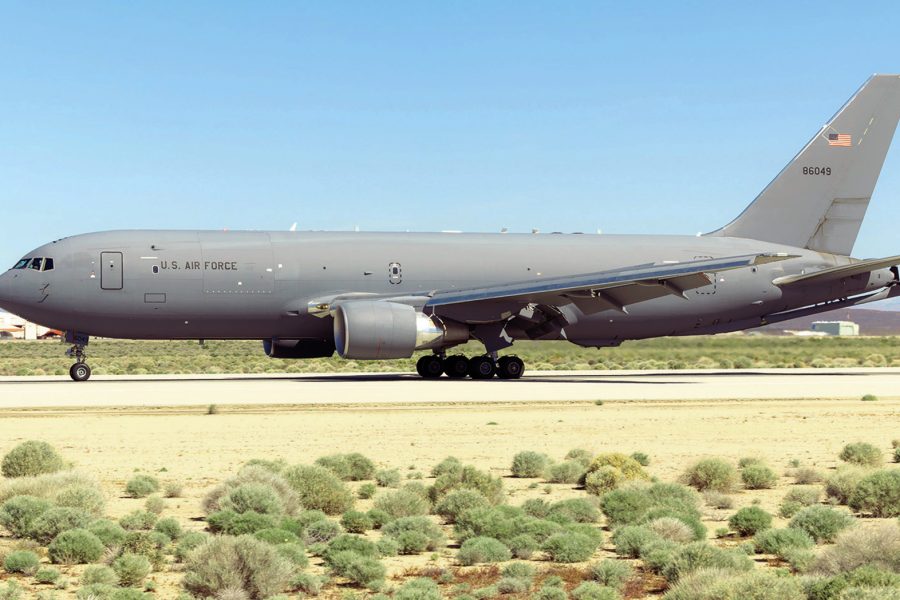Boeing has announced it will buy Spirit AeroSystems, one of its chief suppliers, for $4.7 billion, a move aimed at giving Boeing more cradle-to-grave control of quality, a huge issue for the commercial and military plane-maker in the past year.
The deal is expected to get quick approval from the Federal Trade Commission and Department of Justice.
The move comes amid industry speculation that former Boeing executive, Spirit CEO and former acting Defense Secretary Patrick Shanahan could succeed David Calhoun as Boeing’s new CEO. Calhoun has already announced he will step down later this year, and Shanahan was known as “Mr. Fix-It” at Boeing during his tenure there, for getting troubled programs back on track. However, Shanahan headed Spirit when its current quality control problems erupted.
Spirit was Boeing’s Wichita Division until it was sold off to a holding company in 2005 and was structured as an independent entity. Spirit makes commercial airliner fuselages, fuselage sections, flight decks, wings, and wing components for both Boeing and its archrival Airbus, among other aerospace-related products for various users.
Part of the deal will also be a stock swap between Boeing and Spirit. The total value of the sale, including Spirit’s debt, is $8.3 billion. Spirit’s defense and space revenue came to about $800 million out of a total of $6.1 billion in revenue in 2023.
“Bringing Spirit and Boeing together will enable greater integration of both companies’ manufacturing and engineering capabilities, including safety and quality systems,” Shanahan said in a press release.
Spirit is also a major supplier on some key Air Force programs; notably the Boeing KC-46 tanker and the Northrop Grumman B-21 bomber. For the KC-46, Spirit makes the forward fuselage, strut, and nacelle components, and the fixed leading edge. The Air Force has never disclosed what Spirit contributes to the largely classified B-21, although it is likely its work involves internal structures and some external skin sections. Spirit is one of only seven companies the Air Force has disclosed as B-21 subcontractors.
On its website, Spirit said it contributed to the design of the KC-46. The company also makes large portions of the P-8 patrol aircraft, on which the E-7 Wedgetail airborne battle management aircraft is based. The E-7 and P-8 have large assemblies in common and will be built on the same production line, so Spirit is also likely to be a major supplier on the E-7 when production of that aircraft gears up for the Air Force.
In March, when quality issues at Boeing and Spirit were making headlines, Air Force Secretary Frank Kendall told Air & Space Forces Magazine he was “not aware” of any quality issues at Spirit affecting any Air Force programs. A service spokesperson reiterated that comment two weeks later.
One element of the deal is an agreement with Airbus that the European airliner company will take over Spirit facilities that support Airbus programs after Boeing completes the acquisition of Spirit. Among those facilities are one in Kinston, N.C., where Spirit makes Airbus A350 fuselages; a plant in Northern Ireland that makes A220 wings; a plant in Casablanca, Morocco, that does A320 engine nacelles and A220 fuselage work and a French facility that assembles fuselage sections built in N.C.
Airbus is seeking to compete for the KC-135 Recapitalization Program under which the Air Force will buy 50-75 tankers. The buy will “bridge” between the end of the KC-46 contract and the start of the Next-Generation Air refueling System (NGAS) program, which seeks a new, smaller, and stealthier aerial tanker than USAF has previously operated.
Boeing said its decision to re-acquire Spirit was based on an effort to increase quality and safety at the Wichita-based company, which whistleblowers have charged covered up quality “escapes” that were then only partially caught at Boeing. The quality issues highlighted included mis-drilled holes, mis-aligned fuselage panels, and sloppy administration that either failed to catch and correct mistakes or deliberately under-reported or covered up such errors.
In the press statement accompanying the announcement, Calhoun said Boeing executives believe the deal is “in the best interest of the flying public, our airline customers, the employees of Spirit and Boeing, our stakeholders, and the country more broadly.”
Boeing’s current difficulties came to national attention in early January when an Alaska Airlines 737 MAX 9 suffered a door-sized panel blowout at 16,000 feet altitude. It was later determined that bolts that were supposed to hold the panel in place were removed for a check and then not re-installed. The incident did not result in any lives lost, but did prompt the Federal Aviation Administration to deploy inspectors and watchers to monitor quality at both Boeing and Spirit.
Since then, Boeing has been hit by a series of whistleblower accusations; a Federal Aviation Administration audit; the firing of the 737 program manager; complaints by the National Transportation Safety Board that Boeing is not cooperating with its investigations; loss of paperwork related to the door plug incident, and the death of a Spirit whistleblower.
Previous quality issues moved Spirit’s board to bring Shanahan in last October. Other names floated as a possible successor to Shanahan include Greg Smith, CEO of American Airlines, and a former Boeing Chief Financial Officer; and Larry Culp, CEO of GE Aerospace.


